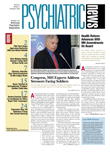This has been a busy fall for APA on multiple fronts. I'd like to tell you about some of our important activities in this column.
As I have reported, health care reform continues to hold the limelight, as Congress addresses the needs of the uninsured, possible systems of care, and financial issues in light of the increased national deficit. Consequently, reform has been the main priority area of our Government Relations staff, as they have worked tirelessly to review and respond to the various initiatives before Congress. APA continues to work with our medical colleagues whenever possible, and we have joined with the AMA in supporting a public option, as long as physicians can opt out without penalty. We have, however, focused specifically on issues that affect our patients and their access to care. We continue to work on ensuring that the progress we have made on parity is not lost or harmed through unintended consequences and that we build on it by eliminating exclusions based on prior illness and by mandating that mental health including substance abuse coverage is a basic benefit in any new plans created or covered by proposed legislation.
Our Institute on Psychiatric Services was held in early October in New York City. While the institute historically has focused on community and hospital psychiatrists, in recent years we have added a focus on sessions directed at psychiatry residents, and this year we expanded the program to address issues devoted more to general clinical practice. Sessions on psychotherapies, psychopharmacology, neurostimulatory devices, and medical comorbidity were presented by leading experts in the field and were very well received by attendees. In fact, we drew the highest number of professional registrants ever. I appreciate the leadership and creativity of Dr. Steve Goldfinger and the program committee, as well as the contributions of Dr. Debbie Hales, Jill Gruber, and other staff, to make this such an exciting and satisfying meeting. (Coverage of the institute will begin in the next issue of Psychiatric News.) Next year's meeting will be in Boston, and we plan to build on this year's successful innovations.
APA's journal
Psychiatric Services provides a similar level of information for clinicians. Under the superb leadership of Dr. Howard Goldman and the editorial board, the articles and special sections have been expanded, providing excellent science and practical translation to clinical systems of care. The journal became a free member benefit a few years ago, and, regrettably, because of the decline of advertising that has impacted not only this journal but many other journals throughout the field of medicine, we had to make the difficult decision to reinstitute charging a subscription fee. Nonetheless, I encourage you to subscribe to this gem of a journal if you have not already done so. The information it provides addresses a range of issues affecting psychiatric care that will help you improve your clinical practice. Members are eligible for a special discount. (See <
http://store.appi.org/main.aspx?pageid=journal/journal&id=PSY>.)
While our major focus is in advocacy, science, and education, none of our work happens without the input of members and the infrastructure of staff. Just as Congress has to address the financial implications of changes in health care, so do we need to address the implications of external changes affecting our finances. APA's revenue derives from three sources: member dues, meetings revenue (a combination of registration, advertising, and exhibit fees), and publications (primarily advertising). This year, as I mentioned above, there has been a major drop in advertising revenue from our periodicals, as well as exhibits revenue in our meetings. For 2009, we had anticipated a shortfall in revenue of approximately $600,000, but with the continued erosion of advertising and other revenues, we are facing a shortfall of about double that amount. Thankfully, we have reasonably healthy reserves that can cover this year's shortfall; however, the Budget and Finance Committee as well as the Board of Trustees are determined to ensure that APA and its subsidiaries have aggregate positive and realistic budgets as well as careful longer-range financial planning.
Since we cannot anticipate that advertising and other revenues will return to their old levels, we need to reassess our planning for 2010 and beyond. The Budget and Finance Committee, led by Dr. Frank Brown from Emory, met in mid-October to revise next year's budget. Not surprisingly, this was a difficult meeting, as the committee reviewed the revenue and expenses and recommended $1.6 million in budget cuts that will be sent to the Board in December for final action.
The proposed cuts come on the heels of reductions instituted this past year for the Board of Trustees, Joint Reference Committee, and components. There is no question that these cuts will cause some pain to APA and its subsidiaries, to district branches, to the Assembly, and to APA staff. But while these changes may be difficult to accept, fiscal discipline is vital if APA is to remain strong and effective and focused on our mission and priorities.
As we deal with these difficult decisions, I welcome your comments and suggestions. I also welcome your comments and suggestions regarding other areas in which your Association is active. Please write me at
[email protected].


